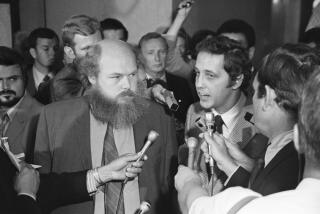Don’t Call Him Bugsy
- Share via
Max Solomon was having a gin martini on the rocks in a bar called the Redwood 2nd Street Saloon, which the downtown crowd refers to as the Red Dog Saloon.
At any given time of the day or night it is filled with lawyers, journalists, office girls, cops and sometimes jurors, who arrive in solemn clusters to dine alone in a back room.
Sweet Alice is reigning queen of the waitresses at the Red Dog. Lanky and efficient, she has been there, it is said in jest, since the Indian Wars.
“Hey, Max,” I said, when I spotted him at a table near the door. He always sits at a table, not a booth. His legs were mangled in a car accident a long time ago and he’s got to stretch them under a table to ease the pain.
“Young man,” he says graciously, “let me buy you lunch.”
Alice sees me and brings over a dry vodka martini straight up, no twist, and I thank her, even though I no longer drink at lunch. Those were the bad old days.
“What brings us here on such a fine day?” Max says in the grand eloquence of an old-time criminal defense lawyer, which is what he is. As he gestures, his star sapphire pinkie ring flashes under the neon.
“Bugsy Siegel,” I say.
“You mean,” Max says with a slight smile, “ Benjamin Siegel.”
Max used to be Bugsy’s lawyer in the 1940s, one of three L.A. criminal attorneys who handled the cases of big-time gangsters who sashayed through Hollywood, trailed by luscious blondes in long fur coats but no underwear.
Showtime, the cable company, is producing a miniseries about Bugsy, and I wanted to know what the real gangster was like before television turns him into a cross between Ollie North and Lee Iacoca.
“In the first place,” Max says, “you never called him Bugsy. You follow me? That could get you hurt.”
Max is wearing a pin-striped suit with bat-wing lapels, wide suspenders and a flashy tie, the kind of clothes he wore when he stomped around the courtrooms 40 years ago.
He is 80 and pretty much retired, though he comes down to his office under the Red Dog almost every day. He wears large, tortoise-shell-rimmed glasses. There are age spots on his balding dome.
“He got the name Bugsy because of his bad temper,” Max says. “Things bugged him. But you didn’t call him that to his face, if you follow me. A reporter did once. Benjamin grabbed him by the collar, lifted him off the ground and said, ‘You s.o.b., don’t you ever call me that!’ ”
Bugsy was capable of killing people and Max knew that, so he pleaded that the reporter was a nice guy and didn’t mean anything. Bugsy put him down, straighted the guy’s collar and let him go with a playful slap in the face.
“Other than his temper,” Max says, “he was a charming guy. The Hollywood crowd loved him. At a hearing once, I looked around and there were some of the biggest stars in town cheering him on. It was like a celebrity show.
“I delivered a negligee for him to a countess on a yacht in Acapulco Bay. Gary Cooper was there, right along with someone from Murder Inc. Hollywood people liked to hang out with gangsters.”
Max figures Siegel came to him because there just weren’t that many criminal lawyers in town in those days. One of the best, though, was Clarence Darrow, the suspender-snapping giant of the Scopes Monkey Trial.
“I saw him one day when he wasn’t so good,” Max says. “He was cross-examining a guy who claimed to have seen his client bite off another man’s ear. ‘Did you actually see him bite it off?’ Darrow demanded. The witness said no. Darrow thought he had him until the guy adds, ‘But I saw him spit it out.’ ”
Bugsy Siegel was shot to death by a crime syndicate hit man on June 20, 1947, in the lavish Beverly Hills home of Virginia Hill, a bedmate and bag lady for the mob.
“They used to only kill each other,” Max said. “Now punks will go out of their way to kill cops. Cops were their friends in those days, if you know what I mean. Chief Parker changed all that.”
Max got up, took his cane and began hobbling slowly toward the door. Then he stopped. “Benny was a nice guy in public,” he said. “But he was a vicious gangster and shouldn’t be glorified. You follow me on that?”
“I follow you, Max.”
He nodded and was gone.
More to Read
The complete guide to home viewing
Get Screen Gab for everything about the TV shows and streaming movies everyone’s talking about.
You may occasionally receive promotional content from the Los Angeles Times.






